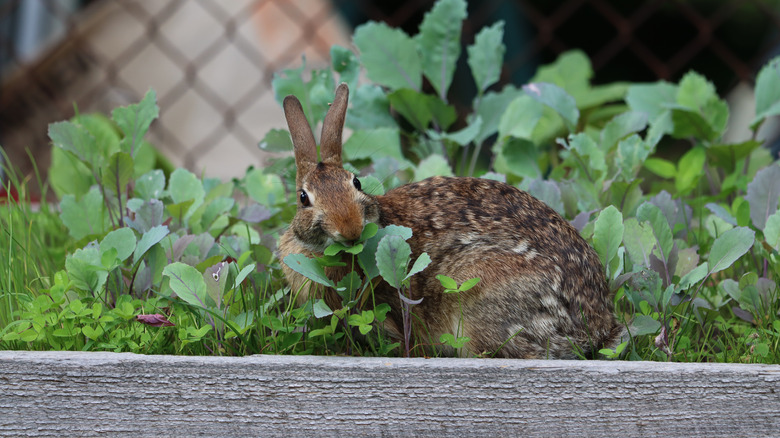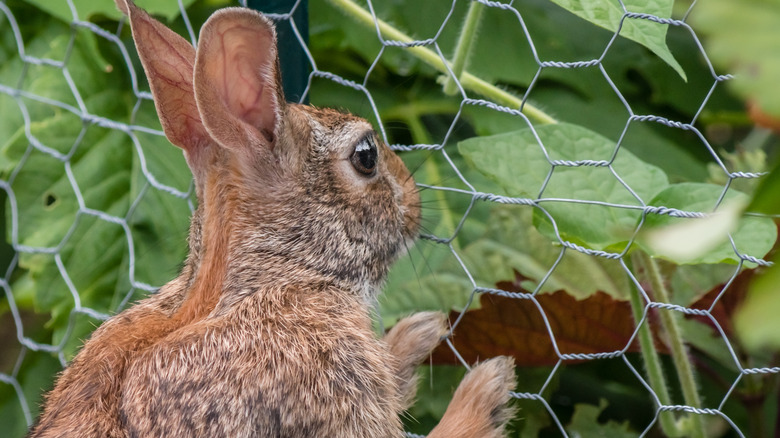The Cotton Ball Hack That'll Keep Rabbits Out Of The Garden
Rabbits may be adorable with their fuzzy ears and twitching noses, but their constant hunger can turn gardens into battlegrounds. Their love for delicate blooms and tender shoots leads them to feast on these plants, leaving gardeners to regret the day that these furry creatures discovered their yards. While traditional methods of rabbit deterrence, such as fences and chemical repellents, may provide temporary relief, they have limitations such as cost, maintenance, and environmental impact. However, a simple combination of vinegar and cotton balls may offer a solution.
Like many other herbivores, rabbits rely heavily on their sense of smell to detect potential predators and locate food sources. Their keen noses can detect even the faintest of scents, making certain odors highly disruptive to their daily routines. The pungent smell of vinegar acts as a potent deterrent, sending a warning signal to rabbits and keeping them away. This natural and non-toxic method has become popular among gardeners and homeowners looking for a way to deter rabbits without causing them harm.
Placement and maintenance
To start, head to your local supermarket or drugstore to purchase white vinegar and cotton balls or grab them from your kitchen and bathroom cabinets. Soak the cotton balls in the white vinegar until they are fully saturated with its pungent scent. The placement of the vinegar-dipped cotton balls is crucial for optimal effectiveness. Think like a rabbit and strategically position them in areas where rabbits are most likely to venture. Flower beds, vegetable patches, and the garden perimeter are prime spots to deploy the cotton ball deterrent. Rabbits typically frequent these areas in search of their favorite morsels, making it essential to establish a protective barrier around your prized plants.
Remember to inspect and refresh the cotton balls regularly. Factors such as weather conditions, evaporation, and time can reduce the potency of the vinegar's scent, reducing its deterrent effect. You can ensure your garden remains rabbit-free throughout the season by routinely replacing the cotton balls.
Other effective strategies for controlling rabbits
While vinegar-soaked cotton balls work well, it can be helpful to use a combination of strategies to keep those little bunnies at bay. Doing so can protect your plants and foster a peaceful coexistence with the wildlife around you. Fences and netting can effectively keep rabbits out of specific areas. Those with small gaps or wire mesh will prevent rabbits from squeezing through. Ensure it is at least 2 feet high to deter them from jumping over. Underground barriers like buried chicken wire can also prevent burrowing rabbits from gaining access.
When designing your garden, consider incorporating plants and herbs with strong scents that rabbits don't like, such as marigolds, lavender, onions, and catnip. Not only do these species add value to your garden, but they can also serve as a natural deterrent. To further discourage rabbits, you can use motion-activated devices or decoys that startle and scare them off. Loud noises, sudden movements, and visual deterrents like owl or snake decoys can disrupt their feeding patterns and reduce their attraction to your garden. Additionally, keeping your garden tidy and free of debris by removing tall grass, weeds, and overgrown areas that serve as hiding spots for rabbits can help prevent them from returning.


